15 Books that Can Change Your Life {And Maybe the World}
This website may earn commissions from purchases made through links in this post.
Good reads guide. Books that can change your life.
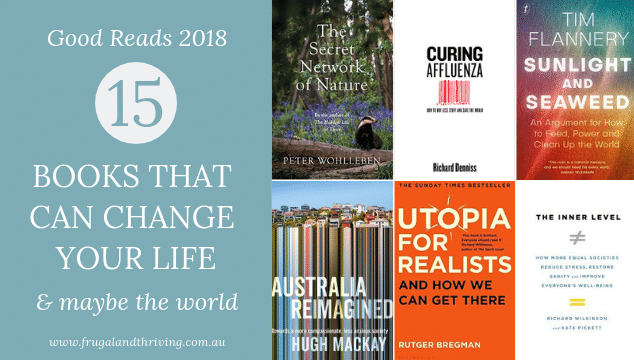
Looking for a great read over the holidays?
There’s nothing like a good book to sink your teeth into. Something that can inspire, invigorate and challenge.
I read a fair share of fiction, both adult fiction and kids books to my kids. But I also love non-fiction for it’s ability to educate and enthral.
Below I share 15 non-fiction books that I’ve read and that have inspired me this year.
15 Inspiring Books for 2018
*I get almost all my books from the library. It’s free and it creates less clutter. Therefore, that’s the place I recommend for procuring books.
But if you want to check each book out further or purchase it for yourself or as a gift (if it’s a really good book, then I might buy it), I have included affiliate links to the relevant page on the Book Depository.*
1. The Secret Network of Nature
By Peter Wohlleben (@ Book Depository)
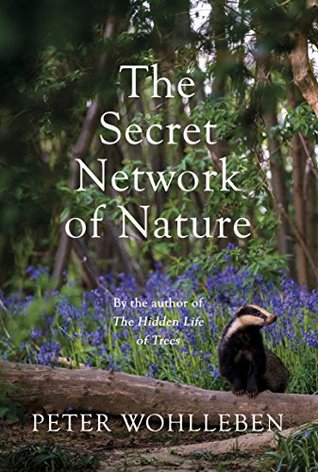
From the blurb:
“Did you know that trees can influence the rotation of the earth?
Or that wolves can alter the course of a river?
Or that earthworms control wild boar populations?
The natural world is a web of intricate connections, many of which go unnoticed by humans. But it is these connections that maintain nature’s finely balanced equilibrium.
Drawing on the latest scientific discoveries and decades of experience as a forester and bestselling author, Peter Wohlleben shows us how different animals, plants, rivers, rocks and weather systems cooperate, and what’s at stake when these delicate systems are unbalanced.”
Of all the books on my list, this is my number one pick. If we can connect with the majesty and beauty of nature with a love that this author obviously has for it, then we’ll be a lot less inclined to destroy it.
From the same author of The Hidden Life of Trees (also a brilliant read), this beautifully written (and translated) book manages to convey the vast and unimaginable complexity of nature in a simple and accessible way.
2. Give People Money: The Simple Idea to Solve Inequality and Revolutionise Our Lives
By Annie Lowrey (@ Book Depository)
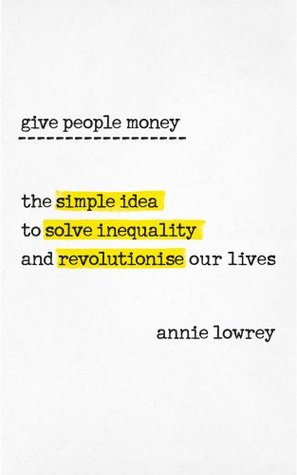
From the blurb
Surely just giving people money couldn’t work. Or could it?
Imagine if every month the government deposited GBP1000 in your bank account, with no strings attached and nothing expected in return. It sounds crazy, but Universal Basic Income (UBI) has become one of the most influential policy ideas of our time, backed by thinkers on both the left and the right…
In this sparkling and provocative book, economics writer Annie Lowrey looks at the global UBI movement. She travels to Kenya to see how UBI is lifting the poorest people on earth out of destitution, and India to see how inefficient government programs are failing the poor… She also examines at the challenges the movement faces: contradictory aims, uncomfortable costs, and most powerfully, the entrenched belief that no one should get something for nothing.
Is giving people free money a crazy idea?
This book is a fairly measured look at whether a Universal Basic Income is realistic. It examines the pros, the cons, the practicalities.
Like how do we pay for it? That’s not an insignificant question.
And will it push us into hyperinflation?
The book also floats possible alternative solutions.
A great introduction to the UBI.
3. Utopia for Realists and How We Can Get There
By Rutger Bregman (@ Book Depository)
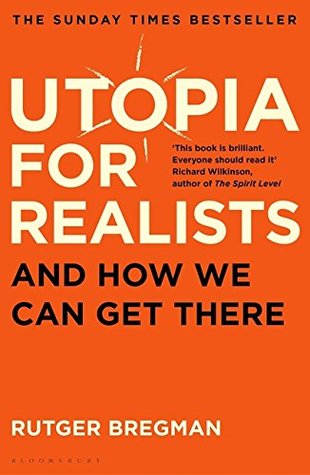
From the blurb:
“In Utopia for Realists, Rutger Bregman shows that we can construct a society with visionary ideas that are, in fact, wholly implementable. Every milestone of civilisation – from the end of slavery to the beginning of democracy – was once considered a utopian fantasy. New utopian ideas such as universal basic income and a fifteen-hour work week can become reality in our lifetime.”
This is another book that covers the UBI as well as other radical ideas like everyone only needing to work part time! This crazy idea was first suggested by the economist Maynard Keynes in the 1930s! He believed productivity would reach a point where we wouldn’t need to work so much and we would have more leisure time.
He obviously didn’t predict that what we would instead pursue were bigger houses and more stuff!
Society is what we make it. It’s not a universal law like gravity. It’s time to reinvent society in a way that’s fairer, healthier and more sustainable. This book has some ideas on that.
4. Sunlight and Seaweed: An Argument for How to Feed, Power and Clean Up the World
By Tim Flannery (@ Book Depository)
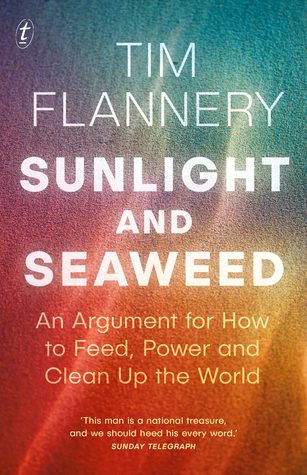
From the blurb:
“Acclaimed scientist Tim Flannery investigates exciting new technologies currently being developed to address our most pressing environmental threats in a book that presents a positive future for us and our planet. Climate change, food production and toxic pollution present huge challenges, but, as Flannery shows, we already have innovative, practical and inspiring solutions.”
Can technology help save us from climate change? In this book, Tim Flannery outlines new technologies that might help provide clean power, among other things.
A hopeful read, especially when everything else about climate change is so depressing. I found the chapter on population size and the chapter on solar generation particularly interesting.
5. Curing Affluenza: How to Buy Less Stuff and Save the World
By Richard Denniss (@ Book Depository)
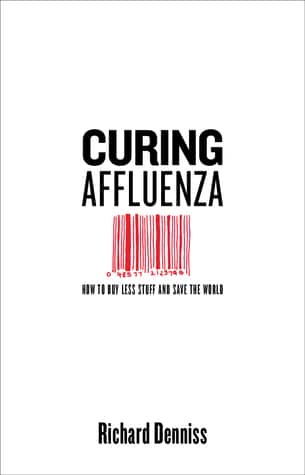
From the blurb:
“A truly modern affliction, affluenza is endemic in Western societies, encouraged by those who profit from a culture of exploitation and waste. So how do we cure ourselves? In this sparkling book of ideas, Richard Denniss shows we must distinguish between consumerism, the love of buying things, which is undeniably harmful to us and the planet, and materialism, the love of things, which can, in fact, be beneficial. We should cherish the things we own – preserve them, repair them, and then gift or sell them when we no longer need them. We must foster new ways of thinking and acting that do not squander limited resources, and which support the things we value most- vibrant communities and rich experiences.”
Richard Denniss is an Australian economist. This book argues that we should be more materialistic! By that, he means we should love our stuff more, look after it more, buy less and dispose less.
6. Lost Connections: Why You’re Depressed and How to Find Hope
By Johann Hari (@ Book Depository)
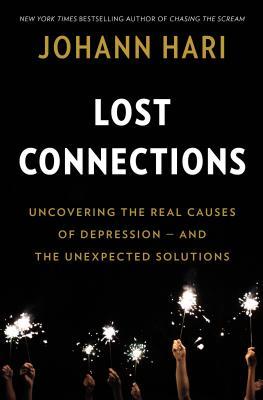
From the blurb:
“Across the world, Hari found social scientists who were uncovering evidence that depression and anxiety are largely caused by key problems with the way we live today. Hari’s journey took him from a mind-blowing series of experiments in Baltimore to an Amish community in Indiana, to an uprising in Berlin. Once he had uncovered nine real causes of depression and anxiety, they led him to scientists who are discovering seven very different solutions – ones that work.”
A bit of a strange addition, but an interesting read. The book is based on the author’s own experiences with depression as well as his research into new and unconventional treatments.
I include it in my list because the book outlines a blueprint for a good life for everyone.
Building connections, with ourselves, with other people and with the environment is something we can all benefit from.
7. Barefoot Investor for Families: The Only Kids’ Money Guide You’ll Ever Need
By Scott Pape (@ Book Depository)
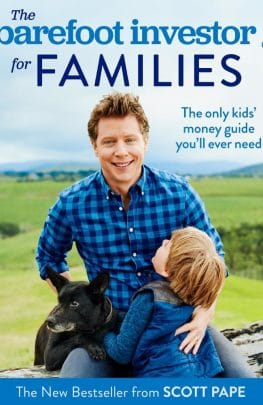
From the blurb:
“Scott lays out ten money milestones kids need to have nailed before they leave home, and it’s all structured around one family ‘money meal’ each week (so roughly 20 minutes).
There are only ten things every kid needs to know about money, and you can teach them over dinner, once a week.”
The Barefoot Investor has a lot of great financial advice – this book specifically looks at teaching kids about money.
We have instated his pocket money system with some slight tweaks and it’s working really well for us. The kids have three age-appropriate chores each week and they get paid half their age, i.e. our 8-year-old gets $4 a week for doing those chores.
In our house, those chores are on top of their “duties”. Duties include picking up after themselves, cleaning their own room, helping mum and dad when asked, putting their own washing away. They don’t get paid for duties, they are expected to do those things.
8. The Inner Level: How More Equal Societies Reduce Stress, Restore Sanity and Improve Everyone’s Wellbeing
By Richard Wilkinson & Kate Pickett (@ Book Depository)
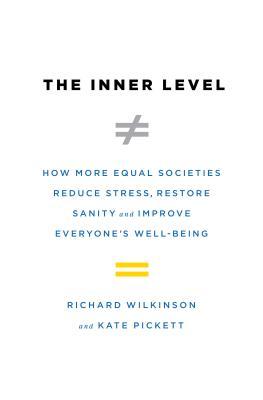
From the blub:
“In The Spirit Level, Richard Wilkinson and Kate Pickett put inequality at the centre of public debate by showing conclusively that less-equal societies fare worse than more equal ones across everything from education to life expectancy. The Inner Level now explains how inequality affects us individually, how it alters how we think, feel and behave. It sets out the overwhelming evidence that material inequalities have powerful psychological effects: when the gap between rich and poor increases, so does the tendency to define and value ourselves and others in terms of superiority and inferiority. A deep well of data and analysis is drawn upon to empirically show, for example, that low social status is associated with elevated levels of stress, and how rates of anxiety and depression are intimately related to the inequality which makes that status paramount.”
Inequality is increasing. As the research in this book and their first book, The Spirit Level, shows, everyone loses in a society that has a huge disparity between rich and poor. This book shows why a fair, more egalitarian democracy is good for everyone and is an ideal to work towards.
9. Blue Collar Frayed: Working Men in Tomorrow’s Economy
By Jennifer Rayner (@ Book Depository)
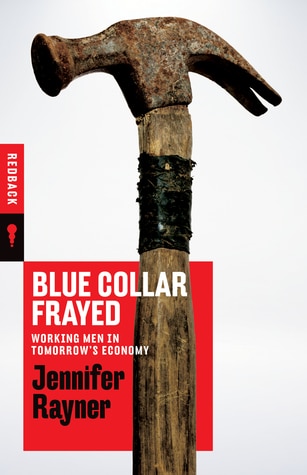
From the blurb:
“But blue-collar jobs for Australian men are disappearing at a rapid rate, and this is not just a product of unstoppable economic forces – it’s also the result of our failure to acknowledge the importance of those jobs and the people who do them. The men now losing their jobs in heavy industry or trades will not easily find new work in Australia’s growing service industries; the evidence shows they are disengaging from the workforce instead.
Drawing on extensive research and dozens of interviews, Rayner argues that there can be blue-collar jobs in our future economy. In fact, we can’t keep building a fair and prosperous Australia without them. Humane and clear-eyed, Blue Collar Frayed is a vital contribution to our national conversation.”
It’s all very well talking about globalisation, artificial intelligence and sustainable living, but what about the impact these changes have on everyday people: our jobs, our livelihoods and our standard of living?
This book looks at the issues caused by a changing workforce and offers up some possible solutions. Solutions like moving towards precision manufacturing (more like Germany) rather than competing with cheap manufacturing (we already do this a little with military manufacture).
Better retraining and education options.
Moving towards sustainable manufacture so that we can have jobs without polluting the environment.
Going green doesn’t have to mean job loss if we have smart policy.
10. Australia Reimagined: Towards a More Compassionate, Less Anxious Society
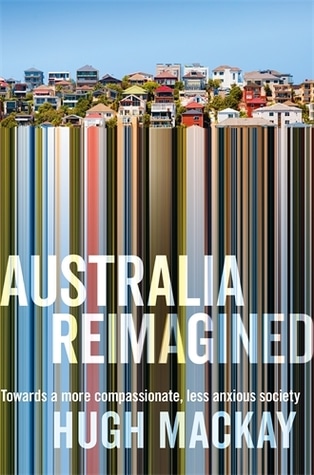
by Hugh Mackay (@ Book Depository)
From the blurb:
“When it comes to our future, misplaced optimism is as dangerous as blind faith. What is needed is the courage to face the way things are, and the wisdom and imagination to work out how to make things better.”
Fangirl here!
Hugh Mackay has written another poignant book about society. A social demographer himself, he’s had many years researching people and society.
While I don’t agree with everything he says in his book, it’s an interesting examination of Australian society and its possibilities.
11. Dollars and Sense: How We Misthink Money and How to Spend Smarter
by Dan Ariely & Jeff Kreisler (@ Book Depository)
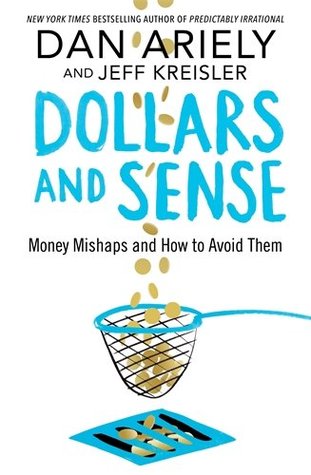
We think of money as numbers, values, and amounts, but when it comes down to it, when we actually use our money, we engage our hearts more than our heads. Emotions play a powerful role in shaping our financial behaviour, often making us our own worst enemies as we try to save, access value, and spend responsibly.
Together Ariely and Kreisler reveal the emotional forces working against us and how we can counteract them. Mixing case studies and anecdotes with concrete advice and lessons, they cut through the unconscious fears and desires driving our worst financial instincts and teach us how to improve our money habits.
Celebrity Behavioural Economist (who knew that could be a thing, right?!) shows yet again in his book Dollars and Sense that we are all less rational than we think we are.
Read: not rational at all.
Knowing the specific rational mistakes we make with our money can help us make better financial decisions.
12. The Knowledge Illusion: Why We Never Think Alone
by Steven Sloman & Philip Fernbach (@ Book Depository)
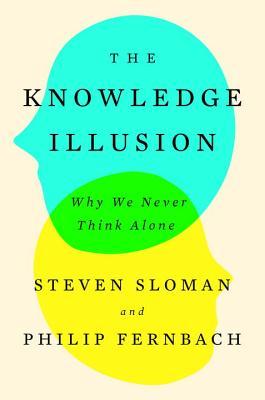
“The human mind is both brilliant and pathetic. We have mastered fire, created democratic institutions, stood on the moon, and sequenced our genome. And yet each of us is error-prone, sometimes irrational, and often ignorant. The fundamentally communal nature of intelligence and knowledge explains why we often assume we know more than we really do, why political opinions and false beliefs are so hard to change, and why individually oriented approaches to education and management frequently fail. But our collaborative minds also enable us to do amazing things. This book contends that true genius can be found in the ways we create intelligence using the world around us.”
This book can be summed up in two phrases:
- We’re not as smart as we think we are
- The group is smarter than the individual
Collective wisdom isn’t just a nice idea. It’s how human knowledge works. Individualism is fashionable, but according to this book, it’s not how humans actually function.
13. Social: Why Our Brains Are Wired to Connect
by Matthew D. Lieberman (@ Book Depository)

From the blurb:
“Social argues that our need to reach out to and connect with others is a primary driver behind our behaviour. We believe that pain and pleasure alone guide our actions. Yet, new research using fMRI – including a great deal of original research conducted by Lieberman and his UCLA lab — shows that our brains react to social pain and pleasure in much the same way as they do to physical pain and pleasure. Fortunately, the brain has evolved sophisticated mechanisms for securing our place in the social world. We have a unique ability to read other people’s minds, to figure out their hopes, fears, and motivations, allowing us to effectively coordinate our lives with one another. And our most private sense of who we are is intimately linked to the important people and groups in our lives. This wiring often leads us to restrain our selfish impulses for the greater good. These mechanisms lead to behaviour that might seem irrational, but is really just the result of our deep social wiring and necessary for our success as a species.”
Is competition human’s dominant nature? Is life just about survival of the fittest? Are we innately selfish?
The answer, according to neurobiology, is no. Humans are wired to be social and cooperative animals. Without this cooperative nature, our complex societies wouldn’t exist. Yes, we’re also competitive, but cooperation has been the key to our evolving society over the last millennia.
14. The Undoing Project: A Friendship that Changed the World
By Michael Lewis (@ Book Depository)
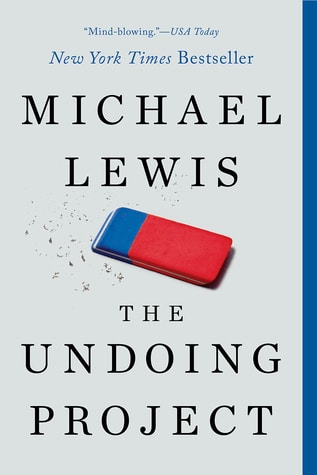
From the blurb:
“In 1969 two men met on a university campus. Their names were Daniel Kahneman and Amos Tversky. They were different in every way. But they were both obsessed with the human mind – and both happened to be geniuses. Together, they would change the way we see the world.”
This book is a biography of Daniel Kahneman and Amos Tversky, two key thinkers who revolutionised the way we think about thinking. If you’ve heard anyone talk about ‘cognitive biases’, these are the guys who discovered them!
If only we could all be aware of our cognitive biases, we might be able to argue less and create a better world.
Their book, Thinking Fast and Slow is a good read, but a hard slog. Michael Lewis’s biography is a more accessible introduction to their work and a fascinating account of their incredible lives. As an interesting side note, their work helped create the field of behavioural economics.
Also of note is this interview of Daniel Kahneman by Krista Tippett (a great podcast, if you’re looking for one, btw).
There are thousands of good books published each year and only time to read a few. I would love to hear which books you enjoyed this year. Let me know in the comments below.
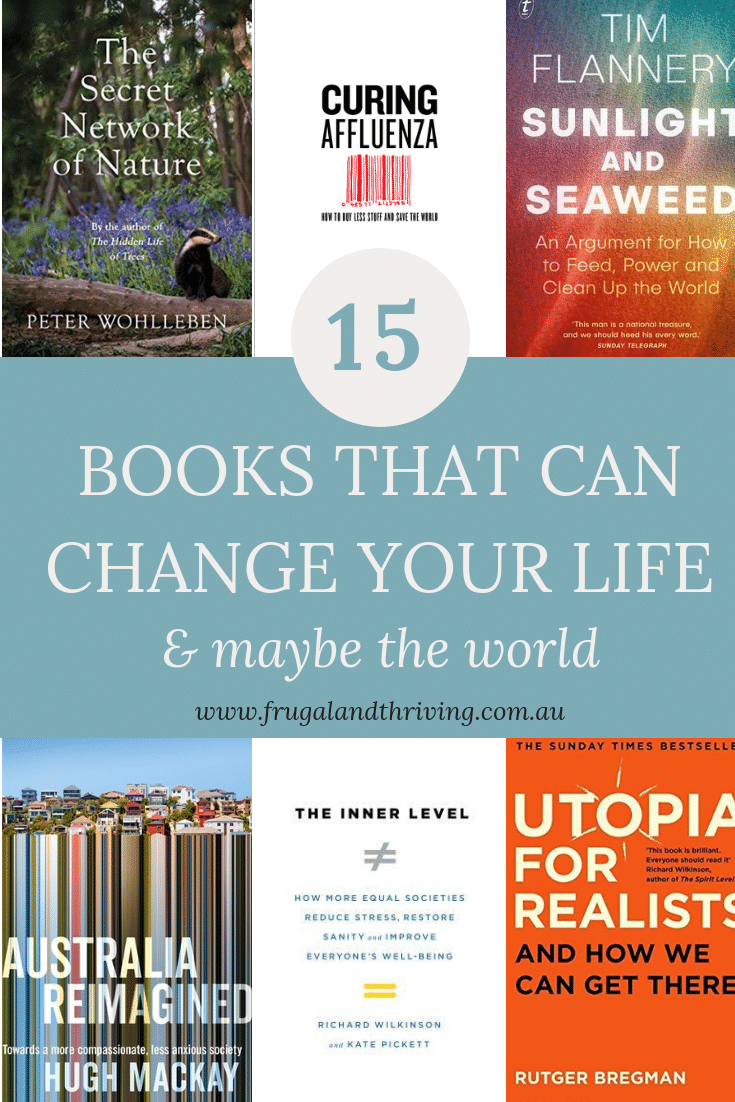



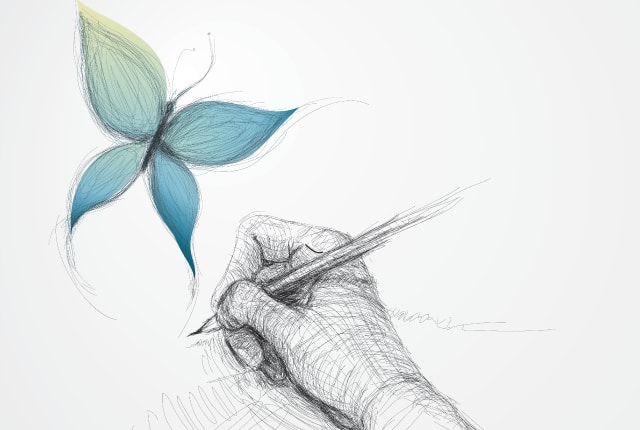
Thankyou so much for this list. I feel as though you have written it specifically for me as every single book is one that i would love to read! I too am a huge Hugh Mackay fangirl ???? I cant wait to read Tim Flannery’s ‘Sunlight and Seaweed’ as I really need a hopeful book about climate change right now.
I have come across some wonderful books over the years through the Chat 10 Looks 3 podcast by Leigh Sales and Annabel Crabb. I really enjoyed Leigh’s own book ‘Any Ordinary Day ‘ this year too.
Thanks again. I can’t wait to hide away from the heat these holidays with one (or all!) of these books!
Hi Emily, I hope you enjoy them!
Thanks for suggestions. I love podcasts and Annabel Crabb, so I’m going to check them out.
Mel
This is such a great list – thank you! My new years resolution is to read more books by looking at screens less and this list is the perfect place to start!
Hi Beck, Hope you enjoy reading. Screen time is challenging – especially if you read Kindle :D
Thanks Frugal, always love your posts, definitely need to read all of these books! Looking forward to reading the one Barefoot Investor! as I’m a single mum…it’s difficult to understand if I’m giving too much or not enough pocket money! Actually the whole list looks pretty interesting and of course The Secret Network of Nature… is right up my street!!
Woow!! Thanks for this amazing list, I’ve read some of the books and I’ll definitely pick more from this selection. I know it’s gonna worth my time and financial investment.
Hey Melissa this looks like a great list! Do you have tips for reading great books on a budget? I use my library but often find specific books aren’t available. If you know of any cheap websites or online libraries I’d be interested thanks!
Not sure where you are but have you asked your library if they do inter-library loans? Our state library is much larger than our local regional library but we can browse the state library catalogue and then request books via inter-library loan. Our service is free, some libraries charge a small fee. If you are allowed to join the state library for free, you can borrow their eBooks without worrying about interlibrary loans.
Alternatively, you can look for second-hand books through Amazon.com (these can be pretty cheap).
I also check eBooks, which are often much cheaper. I keep a list in Goodreads of the books I want to read and then keep an eye on the Amazon daily and monthly deals. I often pick up a book I want to read for less than $5 that way (this can add up though lol).
You can also try Scribd.com, which is a subscription based ebook model but they do a 30-day free trial which you can cancel anytime, so good to check out for free. If you do a lot of reading and they have a lot of the books you want to read, it can be a cost-effective way of reading them.